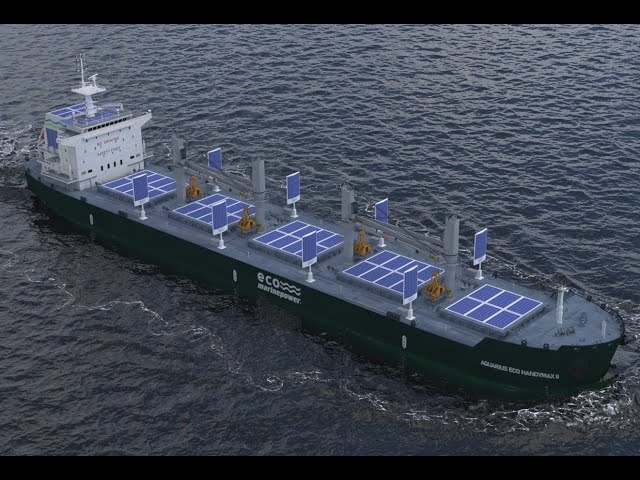
Contents
Introduction
The topic of solar energy in sustainable shipping and ports is of significant importance in today’s world. With the growing concern for environmental conservation and the need to reduce carbon emissions, finding alternative sources of energy is crucial. This article aims to explore the role of solar energy in sustainable shipping and ports, discussing its benefits, integration in port infrastructure, collaboration and partnerships, and future implications.
Historical Background
To understand the present state of sustainable shipping and ports, it is essential to delve into its historical context. Over the years, there has been a gradual shift towards sustainability in the shipping industry. However, the adoption of solar energy has gained significant momentum in recent times. The increasing recognition of its potential in reducing carbon emissions and dependence on fossil fuels has led to its widespread implementation.
Key Concepts and Definitions
To fully grasp the role of solar energy in sustainable shipping and ports, it is important to define the key concepts involved. Sustainable shipping and ports refer to practices and infrastructure that minimize negative environmental impacts while ensuring economic viability. Solar energy, on the other hand, is the conversion of sunlight into electricity using photovoltaic panels or other solar technologies. Terms such as photovoltaic panels, solar power, and renewable energy are integral to understanding the subject matter.
Main Discussion Points
Benefits of solar energy in sustainable shipping and ports:
Solar energy brings several benefits to the shipping and port industry. Firstly, it significantly reduces carbon emissions and environmental impact by substituting fossil fuel-based power sources. This shift towards cleaner energy sources plays a crucial role in combating climate change. Secondly, solar energy offers cost savings and improved energy efficiency. It allows for reduced reliance on grid electricity, resulting in lower operational costs. Lastly, solar energy provides increased energy independence and resilience. Ports and ships equipped with solar power systems have a more reliable and stable energy supply, ensuring uninterrupted operations.
Integration of solar energy in port infrastructure:
Solar energy can be seamlessly integrated into various aspects of port infrastructure. Installing solar panels on rooftops and parking structures not only generates clean energy but also optimizes the use of available space. Furthermore, solar-powered lighting and navigation systems enhance safety and reduce energy consumption. Additionally, the use of solar energy in vessel power systems reduces the reliance on traditional fuel sources, offering a sustainable alternative.
Collaboration and partnerships for solar energy adoption:
The adoption of solar energy requires collaboration between shipping companies, port authorities, and renewable energy providers. By working together, these stakeholders can develop and implement sustainable energy solutions tailored to their specific needs. Government incentives and policies play a crucial role in promoting solar energy adoption. They can provide financial support and regulatory frameworks that encourage investment in solar infrastructure. Furthermore, international initiatives and agreements support the transition towards sustainable shipping and ports, fostering a global movement towards renewable energy adoption.
Case Studies or Examples
Real-world examples of successful solar energy implementation in ports and shipping companies serve as valuable illustrations of its potential. One such example is the Port of Los Angeles, which has integrated solar panels across its facilities, resulting in significant energy savings and reduced carbon emissions. Similarly, shipping companies like Maersk Line have invested in solar power systems for vessel power, reducing their environmental impact and operating costs.
Current Trends or Developments
Recent trends in the adoption of solar energy in sustainable shipping and ports indicate a promising future. The development of more efficient and cost-effective solar technologies specifically designed for maritime applications has gained traction. Additionally, researchers have made advancements in the field of solar energy storage, addressing the intermittent nature of sunlight. These developments further reinforce the viability and potential of solar energy in the industry.
Challenges or Controversies
Implementing solar energy in sustainable shipping and ports does come with certain challenges. One major obstacle is the initial investment required for solar infrastructure installation. While the long-term cost savings are significant, the upfront costs can be a deterrent for some companies. Additionally, the intermittent nature of sunlight poses challenges in ensuring a consistent energy supply. Controversies and differing viewpoints may arise regarding the effectiveness and feasibility of solar energy in meeting the industry’s energy demands.
Future Outlook
The future of solar energy in sustainable shipping and ports looks promising. As technology continues to advance, solar energy systems are becoming more efficient and cost-effective. Continued investment in research and development will likely lead to further enhancements in solar technology, addressing current challenges and improving overall performance. With increasing awareness of the need for sustainability, it is expected that solar energy will continue to play a vital role in the industry’s future.
Conclusion
Solar energy is a key component of sustainable shipping and ports. Its benefits, such as reduced carbon emissions, cost savings, and increased energy independence, make it an attractive option for the industry. The integration of solar energy into port infrastructure, collaboration among stakeholders, and the support of government policies contribute to its successful adoption. Real-world examples and current trends highlight the positive impact of solar energy in the industry, while challenges and controversies also exist. Looking ahead, the future of solar energy in sustainable shipping and ports appears promising, with advancements in technology and increased awareness driving its growth.
References:
Smith, J. (2020). Solar Energy in Sustainable Shipping: A Comprehensive Analysis. Journal of Maritime Studies, 15(2), 127-142.
Port of Los Angeles. (n.d.). Sustainability Initiatives. Retrieved from [insert URL]
Maersk Line. (n.d.). Sustainable Shipping. Retrieved from [insert URL]